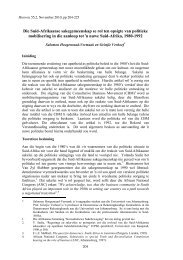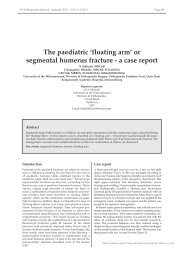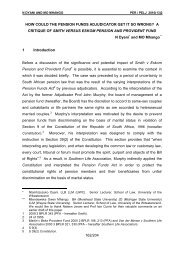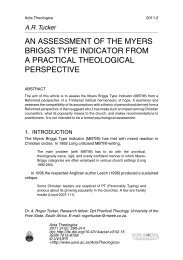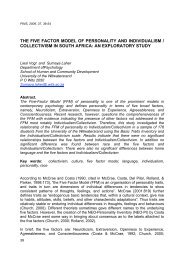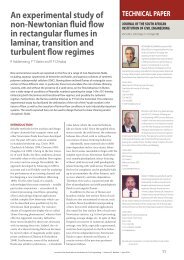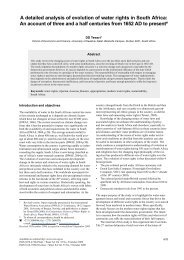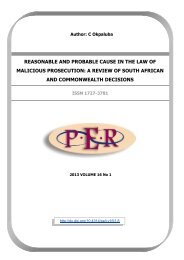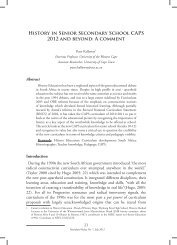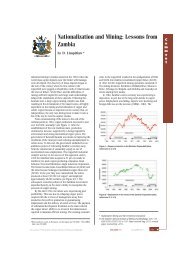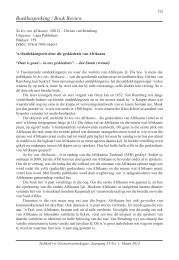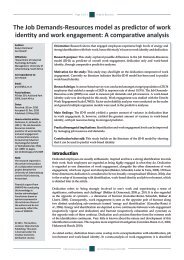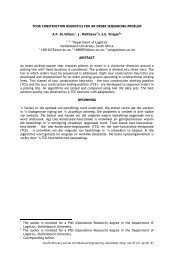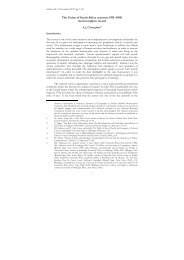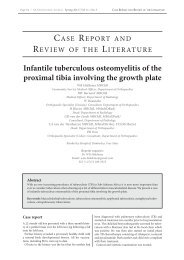91 Hendrik Verwoerd and the Leipzig School of Psychology in 1926 ...
91 Hendrik Verwoerd and the Leipzig School of Psychology in 1926 ...
91 Hendrik Verwoerd and the Leipzig School of Psychology in 1926 ...
Create successful ePaper yourself
Turn your PDF publications into a flip-book with our unique Google optimized e-Paper software.
<strong>Hendrik</strong> <strong>Verwoerd</strong> <strong>and</strong> <strong>the</strong> <strong>Leipzig</strong> <strong>School</strong> <strong>of</strong> Pscyhology<br />
o<strong>the</strong>r phases <strong>in</strong> <strong>the</strong> life cycle. This stance had an important impact on his<br />
views on juvenile del<strong>in</strong>quency, a topic that would occupy him throughout his<br />
years as pr<strong>of</strong>essor <strong>of</strong> Sociology (1932–1936). 68<br />
Gender differences also found an echo <strong>in</strong> <strong>Verwoerd</strong>’s teach<strong>in</strong>g. A Mr<br />
Busemann, one <strong>of</strong> Volkelt’s research assistants, underl<strong>in</strong>ed <strong>the</strong>ir importance<br />
<strong>in</strong> a presentation on language. 69 All this helps to expla<strong>in</strong> why <strong>Verwoerd</strong><br />
submitted proposals to deal with <strong>the</strong> “poor white problem” <strong>in</strong> a highly<br />
<strong>in</strong>dividualised manner, apply<strong>in</strong>g different solutions to different cases, <strong>and</strong><br />
why he rejected more general approaches as <strong>in</strong>sufficient <strong>and</strong> <strong>in</strong>effective. 70<br />
Ethnopsychology<br />
The relativisation <strong>of</strong> universal criteria <strong>of</strong> analysis was not restricted to <strong>the</strong><br />
developmental psychology <strong>of</strong> <strong>the</strong> <strong>in</strong>dividual but also played an important<br />
role <strong>in</strong> adapt<strong>in</strong>g cultural relativism to ethnopsychology. 71 In Wundt’s time <strong>the</strong><br />
young discipl<strong>in</strong>es <strong>of</strong> ethnology <strong>and</strong> psychology were very close, shar<strong>in</strong>g a<br />
strong positivist outlook <strong>in</strong> <strong>the</strong>ir methodology <strong>and</strong> <strong>the</strong>ory. The impact <strong>of</strong><br />
historicism <strong>and</strong> cultural evolutionist stage <strong>the</strong>ories <strong>in</strong> <strong>the</strong> humanities was<br />
considerable <strong>in</strong> <strong>the</strong> n<strong>in</strong>eteenth century. Both <strong>the</strong>ories observed a gradient<br />
between different civilisations <strong>and</strong> placed <strong>the</strong>m <strong>in</strong> an evolutionary sequence.<br />
Thereby <strong>the</strong> so-called primitive societies appeared as <strong>the</strong> liv<strong>in</strong>g remnants <strong>of</strong><br />
former stages <strong>in</strong> <strong>the</strong> development <strong>of</strong> humanity as a whole. This made it<br />
possible to view <strong>the</strong> development <strong>of</strong> mank<strong>in</strong>d as a synchronic panorama <strong>of</strong><br />
cultural evolution <strong>in</strong> <strong>the</strong> present world. N<strong>in</strong>eteenth-century scholars<br />
subscribed to a number <strong>of</strong> stage <strong>the</strong>ories, usually choos<strong>in</strong>g technical<br />
developments as <strong>the</strong>ir pr<strong>in</strong>ciple criteria, especially when <strong>the</strong>se were based<br />
on archaeological data. Thus technical <strong>and</strong> economic developments<br />
underp<strong>in</strong>ned <strong>the</strong> very different <strong>the</strong>ories <strong>of</strong> <strong>the</strong> likes <strong>of</strong> Tylor, Spencer, Fraser,<br />
Morgan, Marx, Engels, Wundt <strong>and</strong> Durkheim.<br />
The differences between <strong>the</strong>ses <strong>the</strong>ories were <strong>the</strong> product <strong>of</strong> various<br />
comb<strong>in</strong>ations <strong>of</strong> economic <strong>and</strong> technical criteria l<strong>in</strong>ked to k<strong>in</strong>ship, social<br />
structures, religion <strong>and</strong> political power. These stage <strong>the</strong>ories had a<br />
considerable impact on <strong>the</strong> newly emergent science <strong>of</strong> ethnology. 72 They<br />
postulated a hierarchy <strong>of</strong> cultures accord<strong>in</strong>g to <strong>the</strong> state <strong>of</strong> development,<br />
with Europe predictably on top. Ethnopsychology did not differ from <strong>the</strong><br />
stage <strong>the</strong>ories <strong>in</strong> accept<strong>in</strong>g <strong>the</strong> cultural stages, but it <strong>in</strong>troduced additional<br />
approaches <strong>and</strong> explanations. Wundt dist<strong>in</strong>guished between <strong>the</strong> stages <strong>of</strong><br />
68. Stellenbosch University, J.S. Gericke Library, Manuscripts Section, <strong>Verwoerd</strong><br />
Collection 231/2 (3), Lecture manuscript, “Socio-psigologie van Misdaad”.<br />
69. AWZGP, Volkelt Papers, Box 33, Notebook 22, Fortschritte <strong>in</strong> der experimentellen<br />
Psychologie der K<strong>in</strong>der, Sommersemester <strong>1926</strong>.<br />
70. Compare Miller, “Science <strong>and</strong> Society”, p 645. Miller’s conclusions are based on<br />
<strong>in</strong>correct assumptions <strong>and</strong> are <strong>the</strong>refore mislead<strong>in</strong>g.<br />
71. See AWZGP, Volkelt Papers, Box 6, Notes “Was ist Kulturpsychologie?” Volkelt<br />
noted that one has to distance oneself from one’s own aestethic norms when<br />
confronted with non-European art.<br />
72. G.W. Stock<strong>in</strong>g, Victorian Anthropology (Macmillan, New York <strong>and</strong> London, 1987),<br />
chapters 5 <strong>and</strong> 6.<br />
109



